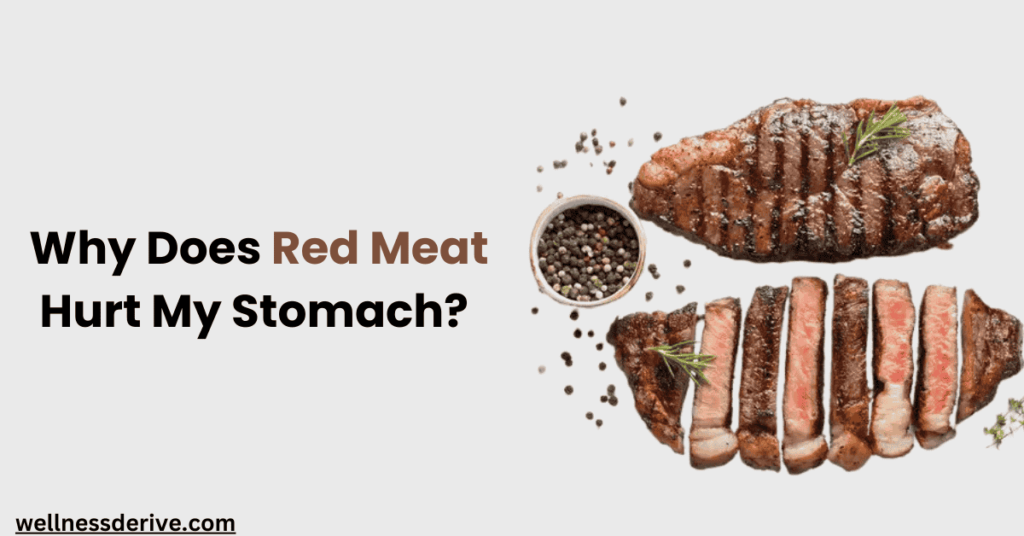For many people, enjoying a steak or burger comes with an unpleasant side effect: stomach discomfort. If you’ve ever wondered, “Why does red meat hurt my stomach?” you’re not alone. Red meat can cause digestive issues for various reasons, from its complex composition to individual intolerances. This article explores the potential causes, symptoms, and remedies for red meat-related stomach pain.
Common Reasons Red Meat Hurts Your Stomach
1. Red Meat Is Hard to Digest
Red meat, including beef, steak, and lamb, is high in protein and fat, making it more challenging for the digestive system to break down.
- High Protein Content: Proteins in red meat require significant digestive enzymes, which can strain the stomach.
- Fat Composition: The fat in red meat slows digestion, potentially leading to bloating or discomfort.
2. Lactose or Additive Sensitivity
Processed red meat, such as sausages or beef jerky, often contains lactose, preservatives, or additives that may upset the stomach.
- Symptoms: Nausea, bloating, or diarrhea after eating processed meat.
- Example: Ground beef with additives may be harder to digest than unprocessed cuts.
3. Intolerance to Red Meat
Some people develop an intolerance or sensitivity to red meat, leading to symptoms like bloating, nausea, and stomach pain.
- Possible Causes:
- Lack of specific enzymes to digest meat properly.
- Allergic reactions to proteins in meat.
4. Red Meat and Gas
If you’ve experienced gas or bloating after eating steak or beef, it’s likely due to the fermentation of undigested food in your gut.
- Causes of Gas:
- Inadequate chewing or fast eating.
- Overeating red meat, overwhelming the digestive system.
Why Does Red Meat Cause Bloating?
Bloating after eating red meat is a common complaint. This happens because red meat takes longer to break down in the stomach and intestines. Undigested portions can ferment, producing gas and discomfort.
Why Does My Stomach Hurt After Eating Red Meat?
Several conditions may explain why your stomach hurts after consuming red meat:
1. Acid Reflux or GERD
Red meat is high in fat, which can trigger acid reflux or worsen symptoms of GERD.
- Symptoms: Burning sensation in the chest, nausea, and stomach discomfort.
- Trigger Foods: Fatty cuts of beef, pork, or lamb.
2. Irritable Bowel Syndrome (IBS)
People with IBS may find red meat aggravates their symptoms due to its high fat content and the effort required for digestion.
- Symptoms: Abdominal cramping, diarrhea, or constipation after eating red meat.
3. Food Poisoning
Improperly cooked or stored red meat can harbor harmful bacteria like E. coli or Salmonella, leading to stomach pain and nausea.
Why Does Red Meat Make Me Sick All of a Sudden?
If you’ve suddenly started feeling sick after eating red meat, it may be due to a condition called alpha-gal syndrome. This condition is triggered by a bite from the Lone Star tick, which causes an allergic reaction to red meat.
- Symptoms:
- Nausea.
- Abdominal pain.
- Severe allergic reactions in some cases.
How to Reduce Stomach Pain After Eating Red Meat
If red meat is causing you discomfort, here are some practical remedies:
1. Eat Smaller Portions
Large servings of red meat can overwhelm the digestive system. Stick to moderate portions to reduce the strain on your stomach.
2. Choose Lean Cuts
Fatty cuts of meat take longer to digest. Opt for leaner cuts like sirloin or tenderloin.
3. Chew Thoroughly
Chewing breaks down meat into smaller pieces, aiding digestion and preventing large chunks from reaching the stomach.
4. Stay Hydrated
Water helps move food through the digestive tract and prevents constipation, which can worsen stomach discomfort.
5. Add Digestive Aids
- Enzyme Supplements: Digestive enzymes can help break down proteins and fats in red meat.
- Ginger or Peppermint Tea: These can soothe the stomach and reduce bloating.
6. Avoid Overcooked Meat
Overcooking can make meat tougher and harder to digest. Stick to medium or medium-rare preparations.
Remedies for Stomach Pain After Eating Beef
If you’re experiencing stomach pain after consuming beef, these remedies may provide relief:
- Apply Heat: A warm compress on the abdomen can ease muscle tension and reduce pain.
- Over-the-Counter Antacids: Help neutralize stomach acid, especially for acid reflux sufferers.
- Probiotics: Support gut health and improve digestion.
When to See a Doctor
While occasional discomfort after eating red meat isn’t typically serious, persistent symptoms may indicate an underlying issue. Consult a doctor if you experience:
- Severe abdominal pain.
- Persistent bloating or gas.
- Nausea and vomiting lasting more than 24 hours.
Symptoms of food poisoning, such as diarrhea or fever.
Frequently Asked Questions
1. Is Red Meat Hard to Digest?
Yes, red meat is harder to digest compared to other foods due to its high protein and fat content.
2. Why Does Steak Make My Stomach Hurt?
Steak may cause stomach pain due to its fat content, slow digestion, or a possible intolerance to red meat.
3. Can Red Meat Cause Bloating?
Yes, red meat can cause bloating, especially if eaten in large quantities or not properly chewed.
4. Why Does Meat Suddenly Make Me Sick?
A sudden intolerance to meat could be a sign of alpha-gal syndrome or a digestive enzyme deficiency.
5. Does Red Meat Cause Gas?
Yes, red meat can lead to gas production, particularly if undigested food ferments in the gut.
Conclusion
If red meat hurts your stomach, it’s essential to identify the root cause, whether it’s difficulty digesting the protein and fat, a food intolerance, or an underlying condition like GERD or IBS. Simple adjustments, such as eating smaller portions, choosing leaner cuts, and chewing thoroughly, can help reduce discomfort.
However, if symptoms persist or worsen, consult a healthcare professional to rule out serious issues like alpha-gal syndrome or food poisoning. By understanding your body’s response to red meat and implementing these tips, you can enjoy your meals with fewer digestive concerns.
Disclaimer: The content on Wellness Derive is for informational purposes only and not a substitute for professional medical advice, diagnosis, or treatment. Always consult a healthcare provider for medical concerns.



